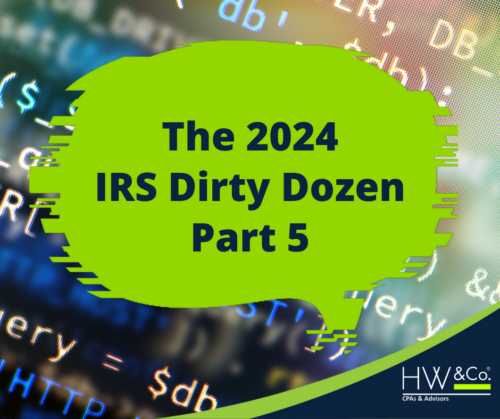 Today, we bring you the final two scams highlighted by the 2024 Dirty Dozen campaign, an annual list compiled by the IRS outlining the most common tax schemes and providing taxpayers with important information about how to protect themselves.
Today, we bring you the final two scams highlighted by the 2024 Dirty Dozen campaign, an annual list compiled by the IRS outlining the most common tax schemes and providing taxpayers with important information about how to protect themselves.
11. Bogus Tax Avoidance Strategies
The IRS warns against two popular tax avoidance ploys: micro-captive insurance arrangements and syndicated conservation easements. Both are high on the IRS’s radar and regularly investigated.
Micro-captive insurance arrangements are used by insurance companies whose owners elect to be taxed on the captive’s investment income only. Abusive schemes involve elements such as questionable risks, duplication of commercial coverages, or the inability to meet legitimate business needs. An additional red flag is that premiums are often disproportionate.
Another tax avoidance strategy is using syndicated conservation easements to exploit a charitable tax break meant to encourage the preservation of land. A conservation easement allows landowners who donate development rights for their acreage to a nonprofit land trust to receive a charitable deduction. However, unscrupulous intermediaries are using syndicated conservation easements to convince land investors to claim charitable deductions that greatly exceed the amount that was invested. The promoters can then charge high fees for their services. The IRS frequently pursues these scams and issues hefty penalties to anyone caught exploiting them.
12. Schemes With an International Element
The IRS is heavily focused on international tax compliance and actively seeks out taxpayers attempting to avoid U.S. tax by using inappropriately using offshore accounts or through other international arrangements. Unethical promoters or tax preparers sometimes bait U.S. taxpayers into using offshore accounts by stating that the IRS does not have jurisdiction or cannot track the assets. This is untrue.
The IRS is also on the lookout for taxpayers who try to avoid U.S. tax by contributing to foreign individual retirement arrangements in Malta or other countries. And they warn U.S. taxpayers to watch for Puerto Rican and other foreign captive insurance scams. Finally, Shady promoters might portray digital assets (e.g., cryptocurrency, stablecoins, or non-fungible tokens) as untraceable and undetectable. However, the IRS can identify and trace anonymous transactions involving digital assets world-wide. You can read more in the full IRS news release IR-2024-105, which addresses these international schemes.
Remember: U.S. residents are taxed on their worldwide income unless they can prove a statutory or treaty exemption.
The IRS urges people to report abusive tax schemes and abusive tax return preparers.
Read more about the IRS’s the other Dirty Dozen campaign:
IRS Dirty Dozen Part 1 – 2024 Campaign Kicks Off by Warnings About Phishing, Smishing, and ERC Scams
IRS Dirty Dozen Part 2 – Fake Online Account Assistance, False Fuel Credit Claims, and Offer in Compromise Mills
IRS Dirty Dozen Part 3 – Fake Charities, Deceitful Tax Professionals, and Social Media
IRS Dirty Dozen Part 4 – Spearphishing and Schemes Aimed at High-Income Tax Filers
We hope you’ve found the Dirty Dozen Campaign helpful and have learned some valuable tips to keep your financial and personal information safe. For more information, please visit the IRS website or contact an HW&Co. Advisor today.
©2024






